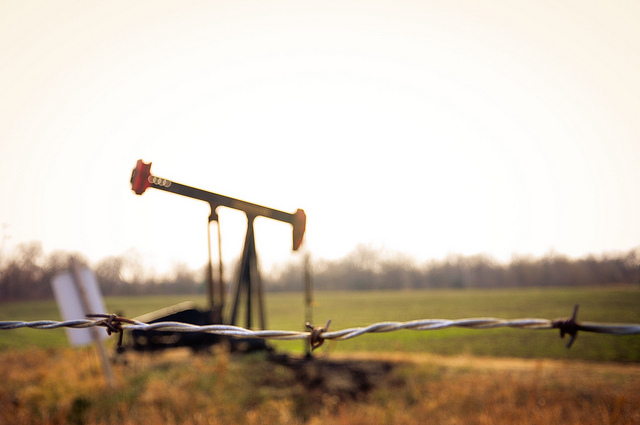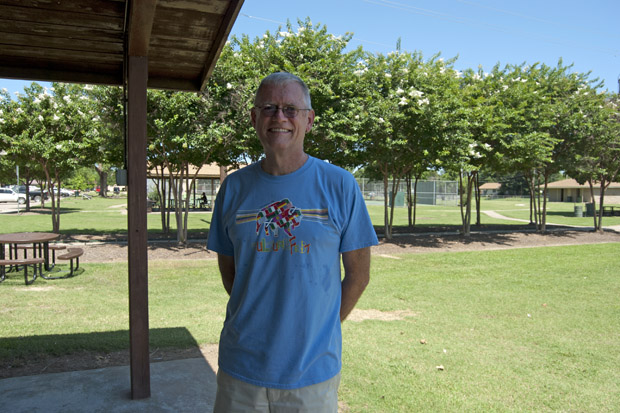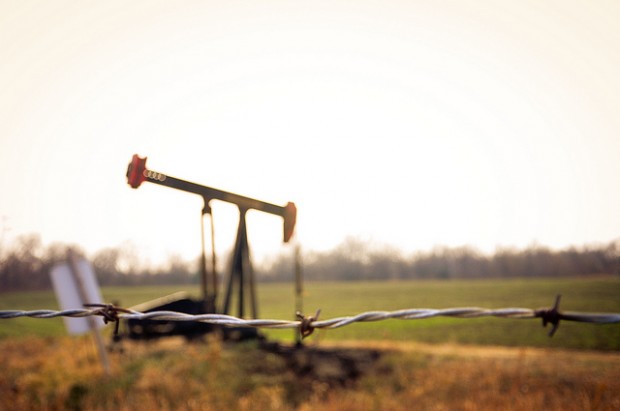
As Communities Prepare for New State Fracking Rules, One City Will Wait and See
-
Joe Wertz
Gov. Mary Fallin signed controversial legislation in May outlawing municipal bans on fracking and other oil and gas activities. Officials in some communities are re-examining their local drilling ordinances to comply with the law, which goes into effect later this summer.
One city in southeastern Oklahoma, however, isn’t budging.
Meet ‘Ordie’
When McAlester Mayor Steve Harrison first heard state lawmakers were writing a law to end citywide bans on fracking and drilling, he contacted his state representative. He then called local leaders in other cities and, later, penned a protest letter to Fallin.
It didn’t work. The bill was signed into law May 29. Harrison’s final move was writing a eulogy, dubbed “Requiem for an Ordinance: 1974-2015.”
“Ordie, as I like to call him, never caused trouble for anyone while he was here. Leastwise, I never heard a complaint,” Harrison says, reciting the sarcastic ode, which was published in the mayor’s newsletter.
Want to hear McAlester Mayor Steve Harrison’s sarcastic “Requiem for an Ordinance” in full? Check out the full eulogy, which we mixed with a little over-the-top funeral music.”
“We were told an ordinance down in Texas had created a ruckus, and that since Ordie was related, he would have to go,” he continues. “Now, I didn’t know that Ordie even knew anybody in Texas. He didn’t get out much. If he had any Texas relatives, he didn’t admit it to me.”
Outlaw ordinances
Harrison’s Lone Star quip refers to the voter-approved fracking ban in Denton, Texas, which was enacted in November 2014. The Denton frack ban spooked lawmakers in Texas and Oklahoma. State lawmakers in both states have since outlawed such ordinances.
In Oklahoma’s 2015 legislative session, more than a half-dozen bills were filed to preempt towns, cities and counties from prohibiting fracking, drilling and other types of oil and gas activities. The prevailing legislation was authored by House Speaker Jeff Hickman, R-Fairview.
In debate at the state Capitol, Hickman addressed McAlester’s ordinance specifically. Since 1974, the city of about 18,000 has banned drilling within the city limits.
“Is this bill going to completely wipe that out?” Rep. Brian Renegar, D-McAlester, asked the speaker during debate over the legislation.
“Yes,” Hickman replied. “They [the city] would need to update that with reasonable restrictions that are authorized in here, but they could not have a blanket ban.”

Joe Wertz / StateImpact Oklahoma
McAlester Mayor Steve Harrison.
Delays, updates
Other city officials spoke out against the bill as lawmakers debated it during the legislative session. The anti-frack ban law doesn’t go into effect until August, but it’s already changing local drilling ordinances across Oklahoma.
For months, Stillwater has been working on an update to its ’70s-era drilling rules. Some residents, many rattled by earthquakes that are linked to oil and gas production and routinely shake the area, have pushed for tougher local drilling ordinances. Before the legislative session had even wrapped, city leaders — assuming the bill would inevitably become law — delayed discussion and re-examined drafts of the proposed ordinance.
The situation is similar in Norman, says Mayor Cindy Rosenthal. In mid-July, an updated oil and gas ordinance will get a second reading. She says the proposed rules were written to comply with the new state drilling law. One change spells out a specific process by which oil and gas companies can challenge the city’s rules as unlawful under the new state mandate.
Parks, prohibition
I interviewed McAlester Mayor Harrison at Chadick Park, which divides downtown and one of the city’s oldest neighborhoods. The location is significant, he says, because it illustrates an element essential to community leaders’ opposition to the new state law.
The ability to prohibit certain types of activities, Harrison says, is central to municipal zoning authority. “That’s exactly what zoning ordinances do by specifying land use,” he says.
McAlester, like all cities, has created separate zones where certain types of business activities are permitted or disallowed.
“We can’t have a barbershop or a beauty salon in a residential area, but now we’re supposed to allow oil wells,” Harrison says.
Big business
Oil and gas drilling is a special kind of business — especially in big-energy Oklahoma. Mineral rights are a class of property afforded special oversight and strict legal protections. That — in combination with the new anti-frack ban legislation — is why officials in some cities have scrambled to re-tool their local drilling rules.
In McAlester, however, there’s no rush.
“We’re going to leave our ordinance in place,” Harrison says. “There’s no reason, I think, to change it.”
Harrison hopes lawmakers will amend the law in 2016 to grandfather in existing city drilling ordinances. Until then, “if somebody were to try to drill within the city limits in opposition to the ordinance then obviously we’d have to look and see what legal remedies we might have at that point,” he says.
Inner-city oil and gas production is accompanied by a list of headaches long enough to drive most energy companies to drill elsewhere. In 2010, the City of Tulsa updated its century-old ban on drilling within the city limits but still hasn’t issued any permits or been approached by any parties interested in drilling there, says city spokesperson Michelle Allen.
McAlester is far from being considered the petroleum capital of the Great Plains, but Harrison says survey crews have identified oil and gas deposits underneath the city. To his knowledge, no oil company has ever asked to drill within the city limits.
Harrison, who spent most of his career working for the energy industry, says that could change if — or when — the price of oil goes up. Even if a large energy company isn’t interested in drilling, future high oil prices could drive a smaller outfit or an individual to seek an inner-city drilling permit.
“Now it’s an issue,” Harrison says. “It may happen.”

